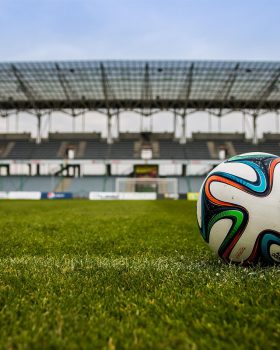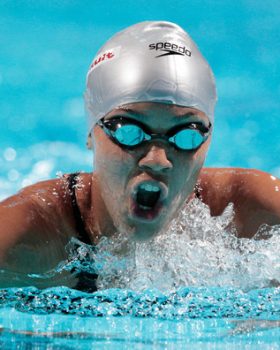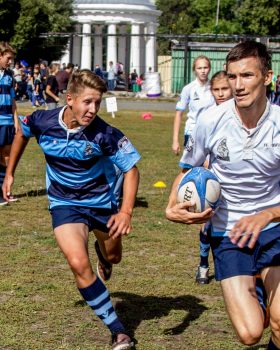For more information about sports scholarships, please contact us or
United Sports USA helps talented student athletes find sports scholarships in universities and colleges around the United States. If you dream about playing collegiate sports in the USA, we can help!
-

Placements in over
40 states of the USA -

over $20,000,000 in funding for our clients
-

Placed student athletes from over 20 nations
Sports
The process
Throughout the years of working with student athletes we have developed a bespoke strategy that delivers the best results.


Latest from the blog
-
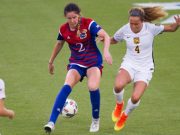
Female soccer star from Scotland reflects on her career at Kansas University
Our Managing Director, Fraser Gibson chats with Lois Huechan about her college career at NCAA D1 powerhouse Kansas University. Lois came through the youth system at Celtic and played international soccer for Scotland at U18 level. She tells us about the trials and tribulations of an elite college female soccer player. The conversation goes into more detail about the transition from Scotland to the USA. A great insight for any young girl who is looking into a female soccer scholarship in the USA. Now that you are ‘done’ with College Soccer, how do you feel about it? I feel a little apprehensive as to what the future holds. The last four years I have had everything handed to me. I get three meals a day, academic support when needed, my finances are taken care of and my housing is also paid for. I will now have to manage all these aspects on my own. However, I am excited to take the skills I have learned playing college soccer into my life after graduation. Let’s rewind to the beginning of your journey. How did you find it moving from Scotland to Kansas? Were there any things that took getting used to? In particular, it took a while to get used to the weather. Summers are very hot and winters are very cold. Playing in the summer heat was very difficult to get used to, but now I can’t imagine anything else. Additionally, being away from my family and friends was hard to begin with. However, when the semester started I had a lot to focus on and not much time to dwell on all the events etc. that I was missing out on. The food was something else that was difficult to get used to. There a lot of bad options. Especially as an athlete, I had to quickly recognise what to eat and what I should not eat. How did you enjoy playing with and meeting people from around the world? Where did some of your teammates come from? I have loved playing on the same team as other girls from around the world. Throughout my four years at KU, I have played with girls from Colombia, France, Germany, Austria, England, Iceland and the United States. I have built relationships with people from around the world, not only on the female soccer team, but with other student athletes. In the future I look forward to visiting friends that I have made through athletics at the University of Kansas. I have made friends with athletes in locations such as Greece, Russia and South Africa. It was comforting to know that there were girls on my team who knew what it felt like to miss family, friends and home comforts. You stared with a bang and had a great freshman year, which isn’t that common. How did you deal with the big expectations on you right from the start? My freshman year was great, until roughly half way through the semester. My coaches noticed that I was always tired and looked drained. After a blood test they discovered that I had glandular fever and I had been playing with it for several weeks. After this I was bed ridden for several months and did not play until the conference tournament at the end of the season. Playing two games a week was a lot more demanding than playing a game a week in Scotland. I believe my body was so overwhelmed with the huge demand on my body, as a result I got sick. To begin with, I didn’t feel like there were huge expectations. I love playing football and have loved every minute of my College career. You had a British coach, but did the coach differ much from what you had at Celtic and Scotland? He was very different. My coach at The University of Kansas offered a lot more coaching points than the coaches in Scotland. In my opinion in America, coaches are more concerned about the individual player improving and in Scotland there is greater concern for improving the team. Additionally, at KU I found training to be less functional than at Celtic. Female soccer in the USA is arguably the best in the world. How did you find the standard when you first moved there? The athletic ability of female soccer players in the states is incredible. However I would say the technical ability of girls in Europe and in Scotland is better. Who is best player you played with and against, in College? The best player I played with was Liana Salazar from Colombia. The best player I played against was Kadeisha Buchanan, who played with West Virginia. She now plays with Lyon in the top French league, and they won the Women’s Champions league in 2017. What were some of the highlights of your College Soccer Career? Beating our rivals (Missouri) in the NCAA tournament and scoring the winning goal. Making history with an 11 game winning streak my freshman year. Visiting 20 states in America and training in some of the best facilities in the United States. Now on to the university side of things. How did you find the classes? Were there any differences in the teaching? Professors expected a lot more from students compared to professors at University in the United Kingdom. For example, I always had homework or some sort of assignment due. However, this ensured students were learning the material rather than waiting until the last moment to study for tests etc. How have you found the demands of balancing your training and games with your education? To begin with it was hard to juggle schoolwork with football. However, as I matured and my time management skills significantly improved it became easier. Our season was during the fall semester and I would always take easier or even less classes during the fall semester to ensure I could get to bed early and not have to stress about school when soccer was my priority. I would take harder classes and more hours during the spring semester when I had more time to concentrate on my education. What are some of the coolest things you got to do outside of Soccer and Classes? Living in the US the past four years I have had the chance to visit some really cool and interesting places. Not only with the team have I travelled round the country, but during holidays I have travelled to some cool destinations. For example, for thanksgiving I went to NYC one year and I have visited and celebrated the holiday with friends on my team in their home locations. The 4th July celebrations was something else I got to experience and I often went home with a different teammate. What do you miss most from back home? My friends and family were something I missed greatly. It was hard to see my friends and family post pictures and to see what I was missing out on. What is next in the pipeline for you? Continuing with Soccer? Coaching? I intend to play football professionally after I graduate on May 13, 2018. I have had several offers and I am currently weighing out the best options to ensure that I can continue to develop as a player and that I am able to live off the salary and benefits I am offered. Watch Lois talking about her golden goal in the match against Mizzou and read more about soccer scholarships in the US.
29 June 2017 -
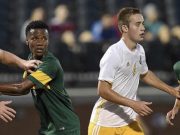
Season Wrap with Robbie Bruce: a freshman talks about his first year at LSUS
Our head soccer consultant Andy Shakarji, recently interviewed our former client Robbie Bruce. Former Scotland Schools National Team midfielder had a successful first season playing for Louisiana State University Shreveport. Robbie gives a great insight on life as an international student athlete, the demands, challenges and experience he has gained as a freshman. You have now completed your first season for LSUS. How would you sum up your performance this season individually and the team? Individually, I think I have performed reasonably well in my first season at LSUS. I played in all 18 games in conference, where I started 17 of them. This shows that coach thought highly enough of me to make an impact on every game. I was able to help the team by scoring 5 goals and provided 8 assists during the conference season. Even though I played in a CDM position, I was still able to provide a good force of attack, as well as help out my team in defence. I was also selected by all the other coaches in our conference to be in the All-Conference First Team. This is a really good honour as I was one of two freshmen to be in this team. Collectively, we had a record of 12 wins and 6 losses. We were slightly disappointed in our record as this is certainly not the best record and we expect to improve this next season. We narrowly missed out on a play-off spot as we were defeated in our last game. Tell me how the adjustment period was moving to LSUS from Scotland? I adjusted really quick. The fact that I came over a month before school started really helped me out. If I came over as school was starting I may have fallen behind in classes and on the pitch. The school is not a large school, this means it is easy to get to know classmates and teachers. This helped me a lot as I was able to feel like I could talk to people if I needed help in class. Living with everyone on the team made it really simple to come to terms with what to do and when to do it. I was in an apartment with 3 other freshmen. This means we are all on the same boat so could turn to each other if we had a question. The soccer isn’t too different to what I am used to in Scotland, therefore I knew what coach was asking for when in training. How was your preseason? What were some of the challenges you faced coming into a new team and the conditions. I’m not going to lie, the preseason we had was really tough. We had double sessions everyday apart from Sundays. It was very demanding physically and sometimes we didn’t have the ball to play with which made it mentally hard. Some of the boys came in out of shape, but by the end of preseason we were all match fit. The heat and humidity was what made it hardest. In Louisiana around August and September, it is almost 100% humidity all of the time. So, when you were walking to the field you would break a sweat. The ice baths after every session was a blessing, cooled me right down and helped my muscles to recover. At the end of our preseason we had fitness tests that we HAD to pass or we could not play. Fortunately, I was able to pass them so I could get on the pitch. Some of the boys were unable to complete these tests and had to sit out some of games until they were able to pass them. This gave me an idea of how harsh college soccer can be in the U.S. You had many incoming freshman players along with yourself. With such a young squad, what were the expectations going into the season from coach Bohn? Coach Bohn had really high expectations. As did we all. In meetings we would discuss what we would like to achieve this year and almost everyone said to reach Nationals. After preseason and training games we were looking very well as a team. But we didn’t know too much about what our opposition would be like. The school is well known for both the men’s and women’s basketball teams being really competitive. These teams are good enough to make it to nationals for the past 7 years. The men’s baseball is also well known for doing really well during season and they usually get into the National tournament. This meant that everyone at our University thought we would also do very well. A lot of pressure. Speaking of Coach Bohn, how has your relationship with the coaching staff developed throughout your freshman year at LSUS? The coaching staff are really great. Coach Bohn provides an enormous amount of help towards the whole programme. He gets a lot of respect from all the players for this. Personally, I get on really well with coach. He is a very intelligent soccer coach and knows a lot about the game. This allowed him to organize training sessions specifically to what we need to improve on. He always found a way to make me give that extra amount of energy to maybe secure a victory or push so we didn’t lose. Off the pitch, he is a very helpful person. If anyone struggled in classes, he would be there to organize tutoring sessions to improve their GPA and boost their confidence in the subject. He is an approachable person who will try to help you with any problem you may have, if its family issues back home, or issues with something at the University. You had played at high level in Scotland coming through the professional youth ranks at Elgin City FC. You have also represented the Scotland Schools National team. How does football or soccer, I should say, differ from youth soccer in Scotland? The level of soccer out here is a lot higher than I expected. In our preseason games, we played some really good teams. Of course, there are those teams in the conference that cannot compete with the rest. But they act as opportunity games for those who don’t play as much to prove themselves to coach. At the top of the conference it is very tight. The top 5 teams could probably all beat each other. In each team, there are players that stand out. You think they could play at a high level, just like in Scotland. With having many internationals in the team from Brazil, Spain, Australia, Venezuela and of course America. How has the various styles of soccer helped your game? The varied styles of play helped me out a lot as I learned a lot of new ways to play. Those from South American were flare players and they had great technique. Training against them allowed me to defend better when it came to games and I was up against the next Neymar. A couple of the boys are from the Netherlands, and they play with the ball. This meaning that they do not do a lot of running, they simply pass the ball about and leave it to do all the work. All of the different styles helped my game as I can play in many styles now. Speed the game up when it becomes dead, or slow it down if we need to relax. What it is like training and spending every day with your team mates? It’s brilliant. Training everyday makes it feel like a professional club. You have a good session and get well looked after by the physio and coaching staff. Being with all my teammates is great as we are always laughing and becoming closer, which is important in a team. We have had FIFA tournaments, 3v3 tournaments, and generally doing everything together. We are never bored as we always find something to do. How have you found the demands of balancing your training and games with your education? For a start, it was tough. But if you keep on top of your schoolwork and do things as soon as you get them assigned, it is no problem. Always put education first, even though I came out here for soccer, the education will last longer. Always ask your teacher for help. If they can’t help, there will be a place for students to get tutoring or help with subjects. Here at LSUS we have a Student Success Centre. This is open every day and provides free tutoring throughout the day. If you are travelling on the road, make sure you take something to study. Bus journeys can be very long, this makes it a perfect opportunity to study or complete assignments. If you are staying overnight in hotels, it is a perfect time to do some more school work. What were some of the highlights this season? For me, scoring goals and enjoying games were my highlights. My team is really tight-knit. We have a great time when travelling together so I would also say that is another highlight for me. Getting into the All-Conference First Team is also a highlight. That will remain a great memory for me as I never thought It would be possible for a freshman. I was also able to travel to places I never thought I would, so that was a boost. Congratulations on being named First Team All-Conference. To have that recognition as a freshman, what was your initial response when you found out? Couldn’t believe it at first. There are many good players in my position in my conference, so I imagine it would’ve been really close. When coach told me that I was named in the first team I was overwhelmed. After all it is what I came out here to do, play soccer to the best of my ability. I thought I had a pretty strong season and I enjoyed every minute of it. But this was unexpected and served as an added boost. Definitely something I am proud of. You are now in your off season. Tell me what your training schedule has been like in preparation for next season? From our last game we played, we only had two weeks off. After our two-week break, we were straight back to the grind. No ball included, just in the gym to improve our strength. We also do aerobic runs and other fitness related activities to prepare us for our next season. We train six days a week, and sometimes we may have double-sessions. The coach only just started to introduce the ball and do some technical work with it, but nothing major. The team have a few spring friendly games lined up so we may start to do more game-related work around March time. What do you miss the most from back home? Family, friends, and my dogs without a shadow of a doubt. It is easy to stay in touch with everyone back home, which makes it lot easier. I wouldn’t say I am home sick because I’m not that kind of person. I’m always too busy to even think about it. The first 5 months I was out here flew by and I was home for Christmas in no time. It seems that this semester is going by really quick as well. I know in a short time I will be home and get to see my family and friends for a long period of time. What are you goals for next season? What do you want to improve on now that you have a year experience of college soccer in the States? Next season I definitely aim for reaching nationals. There are no excuses, but with the amount of hard work we have put in over the past couple months, I am sure we have a better chance of reaching nationals next season. I also aim to get into the All Conference First Team again. I would like to improve on my decision making. Sometimes, in this past season, my lack of experience in college soccer was evident. Now I have one year under my belt. I will be able to learn from mistakes I made and build on them to help my decision making. To wrap things up, what advice would you give for young players considering pursuing a soccer scholarship to the United States? 100% go for it. I have had the time of my life so far. I have met so many people, played against really good teams, and enjoyed every minute of it. Also I have got to see parts of the world I never thought I would. The people I have met are from all over the world and have so many different cultures which is really intriguing to me. This is an opportunity you can’t turn down. I have nothing too bad to say that will throw you off. I have not regretted this decision once since coming out here in August.
29 June 2017 -
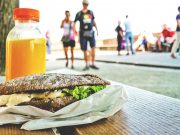
Nutrition tips for (future) student athletes
If you would like to be a student athlete, it means you will have busy schedules filled with classes, training sessions and competitions all the time. The demands of this dual life-style make it even more difficult to stick to a healthy diet and exercise plan. But staying fuelled is essential and is the key to success in the classroom as well as on the field. As a student athlete you will have all the resources to eat well - meal plans usually allow you to eat as much as you like and you won't need to do your dishes! After you finish a gruelling training session you and your teammates will go together to the cafeteria. You can eat whatever you fancy but sometimes you will have to be careful what you choose. Today we would like to share the 5 most important nutrition tips with you to help you prepare for your future student athlete life! Nutrition tips for student athletes Never skip breakfast! One of the most common nutrition mistakes people and many student athletes make is not eating breakfast. Leaving the house without having breakfast will make you feel tired and exhausted. Not to mention it will have a serious effect on your athletic performance! A good balance of carbs and protein is the best to take in the morning, so you kick-start your metabolism and the day feeling energised! Moreover research has shown that college students eating breakfast achieve better grades. So if you would like to perform well academically and athletically make sure you grab something for breakfast in the morning! Stay hydrated and drink water! You probably heard your coach telling you a hundred times how your water consumption is very important during training and competition time. However we cannot emphasise its importance enough! The body of an average adult consists of 60% water which drops quickly during a heavy training due to sweating. If you are dehydrated, your athletic performance declines, your body temperature goes up and you may have headaches and muscle cramps. Always make sure you are in your best shape, try to plan how you hydrate yourself during the day! Women should drink 2.7 liters of fluids a day while men should drink 3.7 liters to keep their metabolism flowing. So take a bottle of water with you all the time no matter where you go! Have a balanced and varied diet! Another common dietary issue is eating the same meals over and over again on a weekly basis. Having a plain and unvaried diet is not only boring but results in depriving your body of some essential nutrients. If you are going for a meal plan in your college or university, always make sure you choose something new. Try to fill your plate with lots of fresh vegetables and unprocessed food as much as you can. In general, limit foods with added sugar and saturated fats; you should rather stick to lean proteins and whole-grain carbohydrates instead. Eat frequently and pack some healthy snacks! One thing you have to make sure is that you eat multiple times during the day. This way you will not feel hungry all the time and you won’t be binge eating late at night. It is handy to have a couple of healthy snacks to pack next to your water bottle in your backpack when you go to school. Think about having a banana or apple, cereal bar, nuts or dried fruits on the go. If you don’t eat frequently your blood sugar level drops and you will not have the energy to perform to your maximum potential. Post-workout recovery and rest Intense training is exhausting your body so you have to eat carbs and protein to recover your muscles and energy level. Utilise your “window of opportunity” (usually 15-45 minutes after your workout) when nutrients are absorbed more efficiently. Also think about getting enough sleep, 6-8 hours a day to ensure proper recovery.
29 June 2017 -

How to Prepare for Your F1 Student Visa Interview
So, you’ve finished the entire student visa application process, including the affidavit of support and gotten your I-20 form from the school. The next steps towards studying in the United States as an international student is the F1 student visa interview. While it is highly unlikely that a genuine student with financial means to study in the United States would fail the F1 visa interview, it is still important that you prepare for it. Here is what you need to know to make sure your interview goes off without a hitch and you get your student visa. What to Bring to Your F1 Student Visa Interview There are certain documents you absolutely must bring with you to your student visa interview. If you don’t bring these, you will fail your interview! Required documents for your student visa interview include: A valid passport; must be valid for at least 6 months after you plan to enter the USA Non-immigrant Visa Application, Form DS-160 (you can print the confirmation page online) Receipt of your application payment Receipt of your I-901 SEVIS fee payment Two passport photos (see photo requirements) Certificate of Eligibility for Nonimmigrant (F-1) Student Status, Form 1-20 (issued by the school where you will enroll The visa interviewer may also ask to see other documents. While they aren’t required, make sure you are prepared and bring: Letter of acceptance from the college Academic transcripts Any degrees or certificates you have Standardized test scores TOEFL scores (if English is not your native language) Documents which prove your income or ability to pay for college. Examples of these documents include: Your scholarship offer (if you received a scholarship), letters from your parents’ employers explaining what they do, bank statements, letters from the bank saying how long the account has been open. Reasons You Might Fail Your Student Visa Interview If you aren’t prepared for your student visa interview, you could fail! You can always request another interview. However, it is best to avoid this and pass the interview the first time around. There are three main reasons why you might fail your visa interview. Reason 1. You Seem Like an Immigrant, Not a Student The number one reason that people fail their F1 visa interview is because the interviewer doesn’t believe they intend on returning to their home country after completing their studies. So, that would make you an immigrant, not a student. The visa interviewer will ask you specific questions about what you plan on doing after you finish the school program in the USA. Be clear that you intend on returning to your home country! Talk about specific plans you have for your future career – making sure to mention the town/city where you want to enact those plans. For example, if you dream about opening a physical therapy facility after finishing school, be sure to mention that you dream of opening it in XYZ city in your home country! But what if you aren’t sure of what you want to do after college? Remember that having a degree from a USA college can greatly improve your chances of getting a good job offer in your home country. Mention that employers in your home country look for people with experience living abroad, especially from reputable colleges, and that having a degree from a USA college will greatly improve your employability at home. Reason 2: They Don’t Believe that You Can Afford to Live and Study in the USA You must be able to prove that you or a sponsor has enough money to cover the costs of living in the USA as well as the costs of the school program. In many cases, your studies will be sponsored by your parents. If your studies are being sponsored by someone who is not a parent or guardian, then you have to show why that person would sponsor you. For example, in this case here, an Ethiopian man was denied his student visa because his sponsor was a “brother of my aunt’s husband.” It seemed suspicious that such a distant relative would agree to be a sponsor. Do ample research on how much studying in the USA will cost (including costs of housing, food, transportation, travel, and healthcare). Compile all of these costs in a spreadsheet (as well as information about how you calculated the costs, such as links to real estate websites or cost-of-living websites). By showing this spreadsheet to the visa interviewer, you will show that you have carefully considered all of the costs of living and studying in the USA. The visa interviewer will want to see proof that you can cover those costs. Contrary to common believe, having a huge lump sum in the bank is NOT always sufficient proof of financial support. The visa interviewer is more interested in whether you have a STABLE source of funds. In addition to bank statements, consider bringing to the interview: A letter from the bank stating how long the bank account has been open and what the average account balance has been. A letter from your sponsors’ employers stating how long they have been employed there and what their position is. Reason 3: You Don’t Seem Like a Genuine Student One of the questions which you will likely be asked at the visa interview is: “How many colleges did you apply to?”. You will also be asked many detailed questions about why you applied to those colleges, the courses, and even the names of the professors at the college. If you only applied to one college, you won’t seem like a serious student. However, if you really only did apply to one college, have a good explanation why. Do not lie and say you applied to other colleges if you actually did not! Additionally, you must be able to prove that you are a serious student who will likely succeed at school in the USA. Prepare to prove this by showing your academic transcripts. Plus any degrees or certificates you have, test scores, and TOEFL scores (for non-native English speakers). Example F1 Visa Interview Questions Also, the visa interviewer will ask you a variety of questions related to your study plans, your ability to support yourself financially, your family and relatives, work, and future plans. Remember to answer each question as specifically as possible. However, keep your answers clear and concise. The interviewer doesn’t need your entire life story! Here are some great webpages with sample interview questions. Read through them, prepare your answers, and REHEARSE! Sample Visa interview questions from Immihelp 65 Sample Visa interview questions from Happyschools Sample Visa interview questions and answers from US Visa Talk Final Tips for a Successful Student Visa Interview Finally, remember that first impressions matter! Dress appropriately for the interview by wearing dressier clothes. Have all of your documents clearly organized, and rehearse your answers so no question takes you by surprise. If you take all of the steps to prepare for your interview, you’ll have no reason to be nervous and it should go off without a hitch.
29 June 2017

